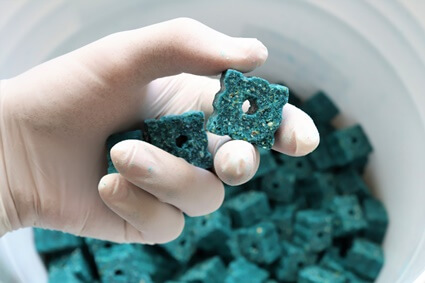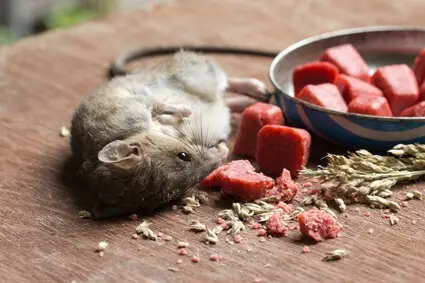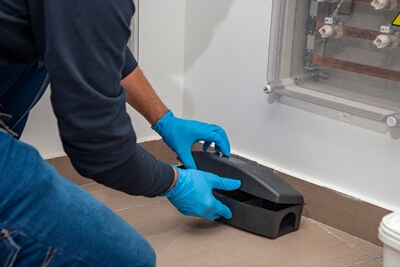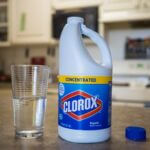Rat poison is one of the most popular pest control methods. You only need to mix the poison with bait, such as household food, and place the toxic mixture in strategic locations.
Then, rat poison works by causing severe internal bleeding, hypercalcemia, and organ damage.
A poisoned rat will be physically weak and dehydrated, so it’ll come out of its nest searching for water, even during the day.
It won’t be able to move quickly and will likely have lost control over its legs. The rat may bleed through its mouth or nostrils and have a swollen abdomen.
The risk of using poison to deal with rat infestations is that the rats may die inside your walls, crawlspaces, attics, and basements.
Unfortunately, this can leave a pungent, unbearable stench. Unless you can access the site and remove the carcasses, you may have to live with these unpleasant smells for weeks or months.
How Do Rats Act When Poisoned?
Poisoned rats will act weak and lethargic. They won’t have the energy to scamper for safety as they often do when facing danger.
Since rat poison causes hypercalcemia, a poisoned rat may become dehydrated and thirsty. The thirst isn’t a result of the poison itself but hypercalcemia.
You may notice weak rats coming out of their nests looking for water to drink, but in most cases, they may be too tired to roam around as they usually do. They lose control of their legs, and most die in their nests.
Rat poison causes internal bleeding and organ damage. Depending on the poison administered, you may notice poisoned rats bleeding through their mouth and nostrils before dying.
Do Rats Suffer When Poisoned?
Rats experience pain and discomfort when poisoned.
Depending on the poison used, the pain can last for days or even weeks until the rat succumbs. For this reason, many animal welfare groups discourage the use of rat poison, considering it inhumane.
Rat poisons contain various toxic chemicals that lead to a slow death. These chemicals cause:
- Internal bleeding
- Lethargy
- Nervous system breakdown
- Cell death
- Kidney damage
- Heart failure
- Seizures
These symptoms emerge gradually, so the rat will suffer for several days before dying.
Another problem with rat poison is that it’s not as effective as it seems. According to the University of Huddersfield, some rats are immune and won’t die after consuming conventional poisons.

How To Know If A Rat Has Been Poisoned
If your bait remains intact and there’s no uncovered food missing in your kitchen after several nights, the rat has likely died from poisoning.
A poisoned rat is usually weak and has no control over its legs. Rats are swift movers and elusive animals, but a poisoned rat can’t run as quickly as a healthy rat.
You’ll know if it is dying from poison if it comes out in the open searching for water. Rat poison doesn’t cause thirst, but it leads to hypercalcemia, which is characterized by severe dehydration.
According to the American Veterinary Medical Association, ingesting rat poison containing cholecalciferol often leads to hypercalcemia. Signs include anorexia, lethargy, and polydipsia.
A rat dying from poison will likely lose weight and fur, and it’ll also appear frail and won’t run with the usual speed that ordinary rats run in life-threatening situations.
Nose bleeding, pale gums, and a swollen abdomen are other signs of a poisoned rat. Since rat poison causes internal bleeding, the poisoned rat may bleed through its nose and mouth.
Poisoned rats eventually die in their nests inside walls and crevices. After about 3 weeks, you will notice an unbearable smell as the dead rat decomposes inside your home.
How Does Rat Poison Work?
Rat poison works by killing rodents through internal bleeding, calcium toxicity, organ damage, heart failure, suffocation, and nervous breakdown. Rodenticides contain various ingredients and chemicals, and each poison works to kill rats and other rodents.
Here are the different types of rat poisons and how they work:
Anticoagulants
Rat poisons that contain anticoagulants work by causing internal bleeding.
They prevent the rat’s blood from clotting, causing it to die slowly several days after consumption. The dying rat will appear lethargic and may experience seizures and abdominal swelling after exposure.
Bromethalin
Bromethalin is a potent rat poison that kills cells in the nervous system and causes death within hours.
The rodenticide is pale and odorless and can kill a rat within 1-2 days after ingestion. A rat poisoned using bromethalin usually loses control of its legs and falls into a coma before dying over time.
Bromadiolone
Bromadiolone is a lethal rat killer that works the same way as anticoagulants.
It prevents the blood of the rat from clotting, leading to internal bleeding and eventual death. Unlike other poisons that require multiple ingestions, bromadiolone can kill a rat in one day.
Cholecalciferol
According to the National Institute of Health, cholecalciferol is a rat poison that causes death through calcium and Vitamin D3 toxicity.
It works by providing an overdose of calcium and Vitamin D3, leading to:
- Kidney damage
- Respiratory issues
- Heart failure
- Nervous system breakdown

Zinc Phosphide
Zinc phosphide is an inorganic compound that works unconventionally by turning into phosphine gas once ingested into the body.
Phosphine is a lethal gas that can cripple a rat’s major body organs within hours after ingestion. A poisoned rat will become weak, anxious, and convulse as the poison takes effect.
Strychnine
Strychnine is a lethal odorless crystalline powder that causes death through asphyxia by limiting oxygen and blood flow to the rat’s brain.
The poison is highly effective and starts working within 15 minutes of exposure.
How Long Does It Take For Rat Poison To Work?
Rat poison doesn’t work straight away after consumption. Depending on the poison used and the dosage consumed, it might take 5-7 days before you get results.
First-generation rat poison is slower and requires close to 7 days for the pest to die, and the rat has to eat multiple doses for the poison to work appropriately. Second-generation poisons are more effective and kill rats through internal bleeding within 3 days.
For rat poison to work as desired, you must place the bait in strategic points around your home, such as attics, basements, under sheds, and inside walls where rats frequent.
Keep the poison away from pets and children to prevent accidental ingestion.







